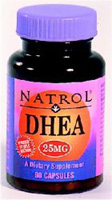
“For almost two years we restored DHEA in older men and women to the high normal levels that are usually observed in young people, but found no beneficial effects on age-related changes in body composition and function,†Dr. Nair says. “No beneficial effects on quality of life were observed. There’s no evidence based on this study that DHEA has an antiaging effect.â€
The double blind study involved 87 men and 57 women who were followed for two years. Participants showed no change in several markers of aging — body composition, physical performance, insulin sensitivity or quality of life.
Mayo Clinic’s findings contradict some of the previous reports on DHEA. Dr. Nair says many former studies were done over shorter periods of time and didn’t involve a large enough group of subjects. Mayo’s study also was strengthened because it was a double blind, placebo-controlled, randomized trial. DHEA was administered only to people with low DHEA and testosterone levels.
Dr. Nair calls DHEA use a controversial issue, as antiaging supplements drive sales in the health food industry. He advises elderly people to stop using DHEA because it is unlikely to offer any antiaging effect.
DHEA has been promoted as an antiaging supplement, say the study’s authors, in part because high levels of DHEA have been associated with longevity in humans and nonhuman primates. But studies involving rodents aren’t applicable to humans, as rodents have very low levels of DHEA, the authors say.
The study also involved administering low-dose testosterone to elderly men who had low testosterone. The authors found testosterone offered minimal beneficial effects on bone density, and far less than those offered by many current accepted therapies. Investigators found no negative side effects, although they caution that the study was conducted only in men without prostate problems.
